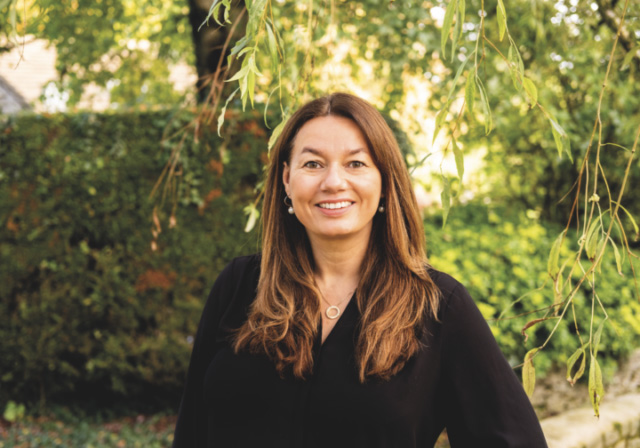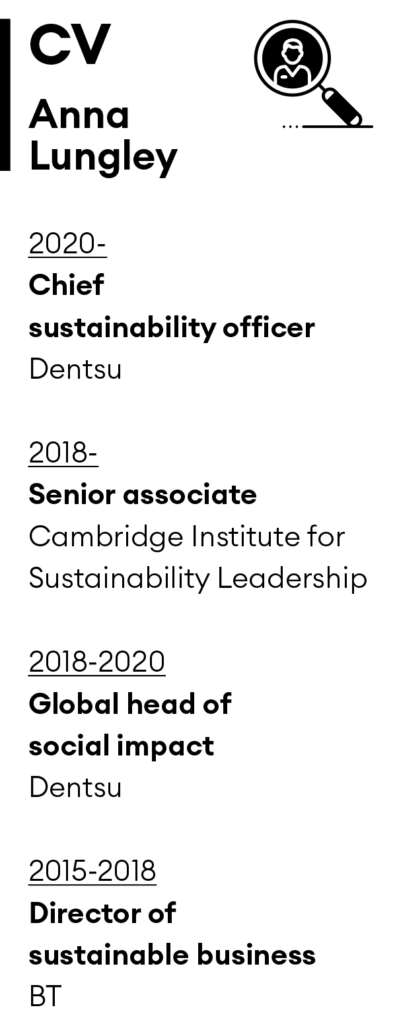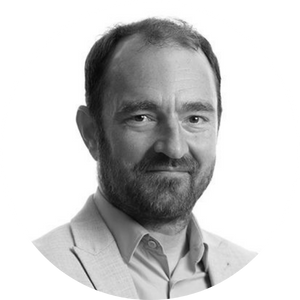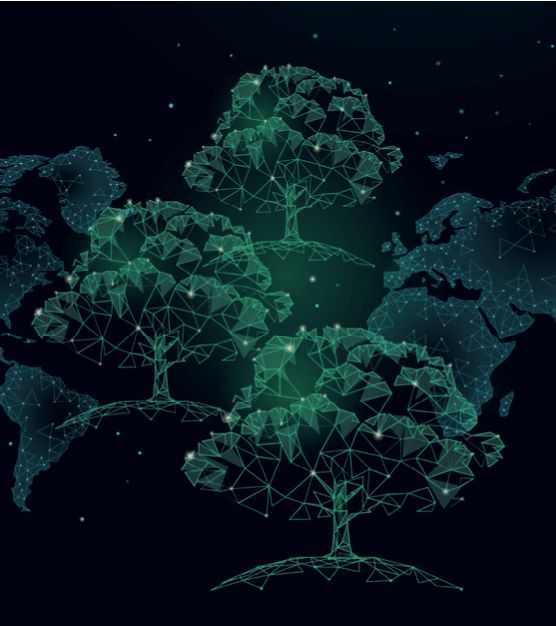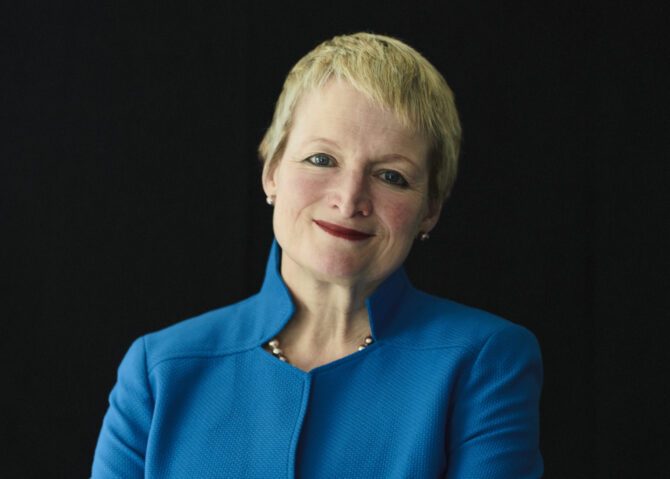Dentsu’s Anna Lungley is brands’ fearless best friend.
We shape the world around us. Thereafter, it shapes us. “In 2018, in Johannesburg, they almost ran out of water,” says Anna Lungley, chief sustainability officer at advertising giant dentsu, “so women had to cut their hair because they couldn’t wash it any longer.
“In Australia, they have been exposed to wildfires – and they’re seeing the extinction of species at a rate we’ve never seen before. In the UK, people have moved out of London – they don’t want to send their children to primary school in the city, because of the air pollution. As climate change becomes increasingly pressing and real, people start to understand, they become engaged.”
For Lungley, this engagement began at a tender age. Her grandmother ran a school in Africa, where she witnessed socioenvironmental problems first-hand. “She was a headmistress in Kenya,” Lungley recalls. “She taught me very early on about inequality. She also shared with me for the first time the biodiversity loss across Kenya. She inspired me – from both a social and environmental perspective.”
If Lungley’s life path was shaped during those early conversations, she followed the trail surefootedly, both at home and in her career. There is a captivating, warm authenticity about her that shines through everything she says and does.
When I ask her about what she does in her leisure time, her immediate response is to reveal she is working toward living more sustainably – by taking her own home off-grid. “We’re installing solar panels at the moment,” she says. “My home is my happy place. So being able to make these projects real is very satisfying.”
Challenging the status quo
That Lungley has an innate passion for her brief is fundamental to her role. She has a challenging, provocative remit: she must tell her own peers – and her own clients – that, like our fossil fuel-hungry homes, their business models need an upgrade. “I need to be able to challenge, both internally and our clients,” she says. “You need to be indefatigable and fearless to do this job.”
Throughout her career, she has been a powerful advocate of brands’ colossal impact on consumer behavior. “Many of our clients have business models that are arguably redundant already,” she says. “They may not know it, but it’s our role to help them navigate that transition. What we have done is to stop and think about what is the true value that we create in the world. And for us, it’s our ability to influence human and societal behavior change. It’s what we do every day.”
It can’t be easy, I suggest, telling truth to power. But it’s precisely this element of the role that drives her. She is as much a missionary as a marketer.
“It’s advertising’s biggest ever creative brief!” she says. “It’s the most exciting opportunity that we have as a business. We’ve got 60,000 creatives and innovators at dentsu who wake up every day to do something that hasn’t been done before.”
Dentsu has integrated its commitment to ESG into its mission statement: “We partner with brands to achieve meaningful progress as a force for growth and good.” It is the fifth-biggest advertising agency network in the world. The group’s clients include General Motors, L’Oréal, Nike, Hilton and Nestlé. Those brands’ influence on global ESG performance is enormous. “Our vision to inspire people everywhere to a new way of living is very much central to our strategy,” says Lungley. “You’ll hear our CEO talk about it all the time. We want our people to understand that if they want to make a change in the world – and 90% of Gen Z do want to work for a purpose-led organization – then this is a fantastic place to be.”
Intertwined challenges
Among her numerous qualities is Lungley’s ability to frame in clear terms why sustainability stretches beyond the scope of environmental science; why the E, S and G of ESG are inextricably intertwined. Too often, sustainability is perceived as separate from the individual; the environment remote from the human existence, rather than integral to it. “Sometimes people depersonalize environment,” she says. “But, actually, it’s the air that we breathe. It’s the water that we drink. It’s the food that we eat. We are completely and utterly dependent upon nature as a species to survive. So those things absolutely do coexist.”
Depersonalization might be temporarily emotionally convenient, but it impedes the smart thinking required to make companies, governments and brands fit for the future. “Sustainable development is about economy, environment and society,” says Lungley. “We often talk about sustainability as the three-legged stool. If one of those elements is off balance, then the world becomes off balance. So it’s really important that we focus on socioeconomic and environmental impacts in harmony – they are deeply connected.”
How does that connection manifest in the real world? She gives an example: “If you think about it from a practical perspective, one of the things you can do to reduce planetary impacts is population control – which may mean educating girls. You can see how that connection immediately arrives.”
Yet in conventional business-schooling, in traditional economics, the term ‘externalities’ implies the opposite: that the environment is around us, not within us. Does she think that we have been quick enough to update our thinking?
“I don’t think it’s well understood, particularly within business,” she says. “Different regions have different perceptions. In the US, for example, sustainability is often perceived as an environmental agenda.”
Does she think that businesses can survive without profound understanding of, and action towards, sustainability? “No,” she says. “I think your tenure will be very short-lived. The scale and pace of disruption is so significant that if you’re not focused on the macroeconomic environment and the risks and the opportunities it presents, then I don’t think you have a sustainable business model. I think in the next four, five or six years, we’ll see some very well-established brands going out of business.”
Credible and constructive
Despite her unvarnished assessment of the near future, Lungley has a relentlessly optimistic message: that individuals, brands and governments do have the power to change the world. She is brands’ honest best friend: credible and constructive. “With anything, it’s breaking it down,” she says. “It’s making it real, it’s helping people to understand and relate, and helping to inspire them with a positive story of change. If it’s all doom and gloom, people don’t get excited about the solutions. But if you’re passionately committed to tackling inequality, for example, one of the biggest things that you can do is take climate action.”
Dentsu’s network has that power in its hands. Carmakers compose much of its client base – all its automotive clients are committed to electrifying the global fleet. But the challenge of convincing consumers that electric vehicles are a ready and viable solution is huge, particularly in the US. Only 1% of cars on the roads of the world’s biggest economy are pureplay electric, yet the Biden administration has demanded that half of all new car sales must be hybrid, electric or hydrogen-powered by 2030. He has the carmakers’ backing – yet that is still, I suggest, a huge gap between ambition and reality. Lungley, typically, is upbeat about the role marketing and advertising can play.
“Ninety per cent of the world’s economies have net zero targets,” she says, “and up to 70% of the emissions reduction required to achieve net zero will come from human and societal behaviour change. So, with the automotive sector, which is one of dentsu’s largest sectors, yes, you do need to invest in infrastructure, you do need to bring new cars to market, you need new pricing plans and new policies to help scale – but you also need to get consumers to buy them! Look at the Super Bowl this year. A 30-second advertising slot cost about $6.5 million. But the fact that you have multiple brands all airing their ads for electric vehicles shows you that brands can come together to push for that change.”
Consumer choice can be shaped, she says, by brands appealing to customers’ emotions. “One of the most powerful tools I think we have at our disposal is empathy,” she says. “The ability to get individuals to care about something that might feel quite remote. That’s how we create change.”
Dentsu works with biscuit brand Oreo, which has won several awards for its #proudparent campaign, which shows a young woman bringing home her girlfriend to meet her parents for the first time. “It makes me cry every time I watch it,” she says. “I absolutely love that it is triggering that feeling in the pit of your stomach, that kind of tug that makes you care about the content. That’s when people start to really pay attention. That’s when you go beyond awareness to changing behavior.”
Yet if hearts matter, so do minds. “The other thing is just information,” says Lungley. “Upskilling consumers! When Proctor & Gamble examined the lifecycle of a washing powder, they realized that a lot of the emissions generated were due to the temperature of customers’ washing machines. You need to sell the washing powder – but you also need consumers to switch the dial down from 30°C to 20°C, that makes a huge difference.
“It’s that act of engaging with your consumer to help equip them and give them the information that they need to make those choices. Education, empathy, awareness: we combine all of them in our toolkit.”
Community impact
In 2019, Dentsu launched two “global accelerator initiatives” – The Code, the company’s flagship schools program aimed at socially disadvantaged young people; and the Female Foundry, which helps women-led businesses thrive. The Foundry has been rolled out to many major economies, including the US, India and China, and dentsu is now actively recruiting from The Code. “We’ve had 30,000 young people go through that program,” says Lungley. “I am excited that three years on, we’re now beginning to hire people off The Code into apprenticeships. It’s been a fantastic success. It’s been something that we’re really proud of.”
Does she ever find time for herself? “I do!” she says. “I’m passionate about marine life. I dive in my spare time as well, and spent the summer studying mangroves and deforestation. All the family are on board. It’s a family thing.”
Her mention of family prompts me to inquire again about the progress of her home improvement plans. When will the off-gridding project be ready? The lady’s not for waiting. “Next week,” she says. “Taking us fully off-grid is probably going to be a longer-term project. But we will be off gas and oil next week.”
